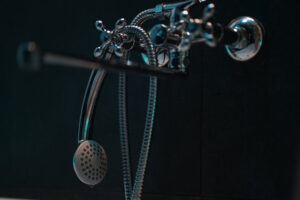If you work until late or have other reasons why you might want to shower late at night, you may wonder if your personal choice is seen as rude. There are several factors to consider when deciding whether your grooming habit is within the bounds of good manners.

Showering late is not rude if it is done properly. If you shower late, take steps to avoid behavior that can wake others or even aggravate medical conditions such as an increase in room temperature, humidity, or excessive noise. Make sure that your shower habit does not interfere with the level of comfort that is experienced by other people.
This article will discuss the situations that may cause someone to shower late at night and whether it is rude to do so in detail.
No one wants to hear anyone showering late at night. Unfortunately, more sounds than you might realize will escape your bathroom to disturb other people in your home. These sounds will even reach neighboring apartments.
If you work the night shift or have other reasons why you shower late, there are several things that you can do to reduce the environmental impact of your behavior, so it is not perceived as rude.
Benefits for Young and Elderly People
The young and elderly may both sometimes go to sleep late at night. Researchers have shown that bathing before sleep has a positive impact on people aged 65 and older, and individuals between the ages of 17 and 22.
The elderly reported that they fell asleep more quickly and experienced better sleep when they showered before going to bed.
Researchers observed that participants in the study who showered before sleep had fewer body movements during the first three hours of sleep.
This was true for both young and elderly subjects.
When people shower late at night, they usually are trying to ensure that they enjoy the full benefits of sleep.
Avoid Noisy Behavior
Some people are especially sensitive to bumps in the night. If the family cat decides to run from one end of the room to the other, they’ll hear it, wake up and they won’t get back to sleep easily. Some may not wake fully but the background noise, which is described as white noise in this case by researchers, will make them restless.
A study published in the Noise and Health Journal has shown that nighttime environmental noise affects cardiovascular health. Even low-level noises can impact the quality of sleep that others in your home experience.
If you decide to shower late, keep it brief.
Limiting the duration of your late shower limits the exposure to background noise. Others in your environment will be affected even if they are not fully aware of the noise and only detect it subconsciously.
If an individual showers late at night to experience better sleep, it is important to do so in a way that does not disturb others.
For example, you can:
- Avoid singing or humming in the shower late at night
- Avoid turning on noisy devices, such as hair dryers
- Don’t turn on the shower at full volume
Simple adjustments in your routine can make it easier for those around you to sleep through your shower. If you shower late and then dry your hair using an electrical appliance, you are very likely to disturb someone else.
That would be considered rude since you would wake someone from their peaceful sleep.
If you want to wash your hair and then dry it with a noisy appliance, consider doing so at a time when everyone in your household is awake. This is more thoughtful than using a noisy device late at night.
Avoid Bright Lights and Extreme Temperatures
The bathroom that you use for your shower may be located in an area that allows bright lights to reach someone else while they are in bed. If this is the case, the bright light can wake them from their rest. This can cause the individual to become irritated and even result in a heated discussion over your showering habits.
If you need to shower at night, consider doing so with a night light on in the bathroom, instead of regular bright light. This is particularly helpful for en suite bathrooms if you share your bedroom with a spouse or another loved one.
You could even shower in the dark. Many people find showering in dim light or with no light soothing and relaxing after a long day.
A study done by Nico Romeijn et al in 2012 examined the effect of temperature extremes and environmental light on wakefulness and the regulation of sleep.
Skin temperature affects the regulation of vigilance and sleep.
Keeping the skin temperature of everyone in your home fairly constant can enhance their sleep but a sudden rush of heat from a hot shower can make another person in your bedroom uncomfortable and even cause insomnia.
Avoid Strong Fragrances
Lavender, blueberry, and other pleasant scents can be relaxing. However, some of these strong fragrances can cause people to be roughly roused out of their sleep.
This is particularly true for people who have allergies or respiratory conditions. If you shower late at night, think carefully about the type of fragrances that you want to use.
Mild fragrances are usually a better choice than those that may trigger an allergic reaction in anyone who shares your home. Also, refrain from spraying perfumes and using lotions with a strong scent right after you shower, if you’re aware that those scents can potentially make others in your home have medical difficulty.
Opening and Closing Drawers
After you shower late, you may want to search for something comfortable to wear. The sound of heavy oak drawers opening and closing can also disturb other people in your family.
If you arrive home late after a long day and want to shower, take extra care to open and close furniture quietly. Your family members and neighbors will appreciate it.
The sudden bang of a door closing can unpleasantly wake someone. Also, spray hinges with a little lubricant to ensure that they never creak or squeak. Even sounds that are as slow as 30 decibels have been found to impact sleep quality. European studies have shown that these disturbances cause serious health effects.
Noise Insulation
If you like to shower late and plan to do so for the rest of the foreseeable future, consider adding insulation to your bathroom. This helps to cut down the noise that is heard by others around you late at night.
You may not be aware of it but people in neighboring apartments can hear sounds such as:
- Taps being turned on
- The flushing of your toilet
- Taps turning off
- Splashing in the bath
- Water splashing against the wash basin as you rinse toothpaste from your mouth
Talk to an insulation company about steps that you can take to ensure that your late shower or toilet use does not disturb neighbors on the floor below you. Some forms of insulation can significantly reduce the amount of noise that leaks to your neighbors so that they can sleep through the night peacefully.
If you live in an older building, it may not have good sound insulation. If you are renting, consider speaking to your landlord about moving you to another apartment or putting in sound insulation.
If you own it, the decision to put that measure in place so you don’t disturb your neighbors if you shower late is up to you.
If you shower late almost every day in a building where there is very little insulation, it could be seen as rude. If possible, you could vary your shower habits a bit, so that the noise does not disturb others daily.
This type of problem is also likely to arise in buildings that do not follow recommended protocols, such as placing bedrooms and living rooms far from areas where the plumbing for bathrooms is located.
Nowadays, many buildings offer inhabitants compact spaces that are more affordable. The spacing that would improve noise control is not there.
It’s important to note that if your neighbors complain about shower noise coming from your home late at night, they aren’t saying that you’re noisy people. Simple operational noise such as water running through the pipes can be heard late at night, even in other apartments.
When possible, try to refrain from showering after around 11 p.m. regularly. Try to refrain from flushing the toilet excessively after this time as well. No matter how quiet you try to be, you will disturb others because even the taps make a sound that can be heard by others in apartments close to yours.
Noisiness is subjective and some landlords like to place more active tenants on the ground floor or lower floors, to avoid certain problems.

Sophie Hammond is a journalist, psychologist, and freelance speechwriter for people in politics and business. She lives on the edge of the Rocky Mountains with her dog and a lifetime supply of books. When she’s not writing, she can be found wandering through nature or journaling at a coffee shop.

